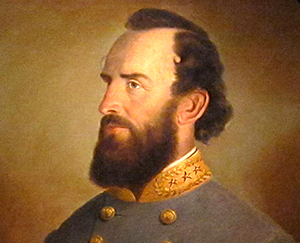May 10
Published in On this Day listing- 1972 In a referendum on Ireland’s membership of the European Community, almost five to one voted ‘Yes’—1,041,890 in favour, 211,891 against.
- 1869 The 1,776-mile US transcontinental railroad was completed when the Central Pacific Railroad from the west and the Union Pacific Railroad from the east met in Utah.
-
1994 Nelson Mandela was sworn in as the first president of a multi-racial South Africa.
- 1972 Referendum in the Republic of Ireland on entry to the European Economic Community—1,041,890 in favour, 211,891 against.
- 1863 Thomas ‘Stonewall’ Jackson, outstanding Confederate general in the American Civil War (1860–5) was killed by ‘friendly fire’. His ancestral home stands at the Birches, Maghery, Co. Armagh.

Above: Thomas ‘Stonewall’ Jackson. (Smithsonian National Portrait Gallery)
Thomas ‘Stonewall’ Jackson (39), Confederate general in the American Civil War (1860–5), died from wounds inflicted by his own troops when they mistakenly shot him during a reconnaissance mission near Chancellorsville eight days previously. Formerly a professor at the Virginia Military Institute, Jackson earned his sobriquet for his dogged stand against a fierce Union assault at Bull Run in July 1861. Regarded as one of the most gifted tactical commanders in US history, he subsequently outmanoeuvred his Union counterparts in the Shenandoah campaign (1862), saved Robert E. Lee from disaster at the Battle of Antietam (9/1862) and further embellished his reputation for gallantry at Fredericksburg (12/1862). Promoters of the virtues of eighteenth-century emigrants to America, mainly Ulster Presbyterians (whom they classify as ‘Ulster Scots’), hold ‘Stonewall’ in high esteem. Yet his Coleraine, Co. Derry-born great-grandfather had little to show in that department when he landed in Maryland in 1747. John Jackson disembarked from a penal ship, having been convicted in the Old Bailey for the theft of £170 and sentenced to seven years’ transportation. On board he struck up a relationship with a Londoner by the name of Elizabeth who had been convicted in an unrelated case for stealing ‘19 pieces of silver, jewelry and fine lace’. An interesting couple, they subsequently married and mended their ways. In matters of religion, ‘Stonewall’ was a classic Ulster Scot. An ardent Presbyterian, he regarded the war as a crusade against the Philistines of the Union and invariably referred to ‘Providence’ in his dispatches. Theology, apparently, was the only subject that he genuinely enjoyed discussing. A dull fellow indeed!
- 1318 The Battle of Dysert O’Dea, Corofin, Co. Clare. The defeat of Richard de Clare by the combined forces of Murtagh O’Brien and Conor O’Dea ended Anglo-Norman dominance in Thomond (north Munster).
















